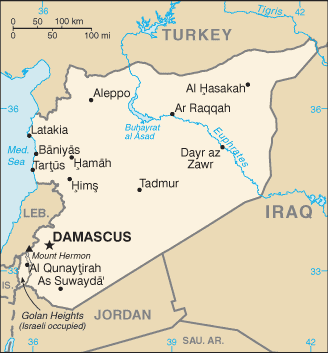Anonymously cited US intelligence sources claim the Syrian military has “locked and loaded” chemical nerve agents inside aerial bombs, as the Obama administration reiterates chemical warfare as its “red line” for military action in Syria.
 “The military has loaded the precursor chemicals for sarin, a deadly nerve gas, into aerial bombs that could be dropped onto the Syrian people from dozens of fighter-bombers,” NBC reports US officials as saying.
“The military has loaded the precursor chemicals for sarin, a deadly nerve gas, into aerial bombs that could be dropped onto the Syrian people from dozens of fighter-bombers,” NBC reports US officials as saying.
“As recently as Tuesday,” however, “officials had said there was as yet no evidence that the process of mixing the ‘precursor’ chemicals had begun.”
The Obama administration on Wednesday again repeated a vow to take military action against the Syrian regime of Bashar al-Assad if it uses chemical weapons to crush the armed rebellion trying to overthrow it.
“Our concerns are that an increasingly desperate Assad regime might turn to chemical weapons, or might lose control of them to one of the many groups that are now operating within Syria,” said Secretary of State Hillary Clinton on Wednesday.
“We have sent an unmistakable message that this would cross a red line and those responsible would be held to account,” she added.
But some wonder whether these reports are being blown out of proportion. The Russian government on Tuesday claimed the West was knowingly overstating the threat from the Syrian regime’s chemical weapons stockpiles, adding tension to the geo-politics surrounding Syria’s civil war.
“I take these reports with a large grain of salt,” writes Middle East expert Juan Cole in reference to the risk of Assad deploying chemical warfare on the Syrian rebels.
“Chemicals would be difficult to deploy against a guerrilla movement of the sort the Baathist government of dictator Bashar al-Assad is facing,” Cole explains. “Moreover, Syria’s mixed population makes it difficult to use chemical weapons on rebels without killing Alawi Shiites and other groups that so far have largely been an underpinning for the regime.”
In addition, despite how desperate Assad might be, it’s unlikely he views chemical warfare as in his best interest. The only thing worrying the Assad regime more than the rebellion is the prospect of some kind of US-led bombing campaign or invasion, which the US has vowed to engage in if chemical warfare takes place and which could undoubtedly topple the regime. Assad isn’t about to attract that sort of attention.
“Last time this happened,” writes Bilal Y. Saab, Executive Director of the Institute for Near East and Gulf Military Analysis in The National Interest, “worries that chemical attacks on rebels or the civilian population were imminent ended up being unfounded.”
It’s unclear as well what the Obama administration is prepared to do in the unlikely event that Assad uses chemical weapons. Tens of thousands have already died in Syria’s bloody civil war, and the administration has not militarily intervened.
This is primarily because they lack feasible military options. A no-fly zone is likely to put more civilians at risk, and bombing the chemical stockpiles would be about as bad as Assad unleashing them on his own targets. If the US were to move in with ground forces to secure the weapons, it would take at least 75,000 troops, a huge commitment that a war weary American population isn’t about to condone, especially since any limited mission to secure the weapons would lend itself to mission creep and eventually turn into regime change, which would eventually turn into a long and bloody occupation costing hundreds of thousands of lives à la Iraq.


